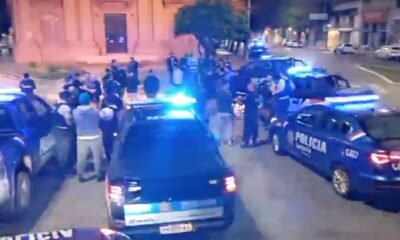INTERNACIONAL
Hidden communications devices found in Chinese solar power inverters spark security alarm
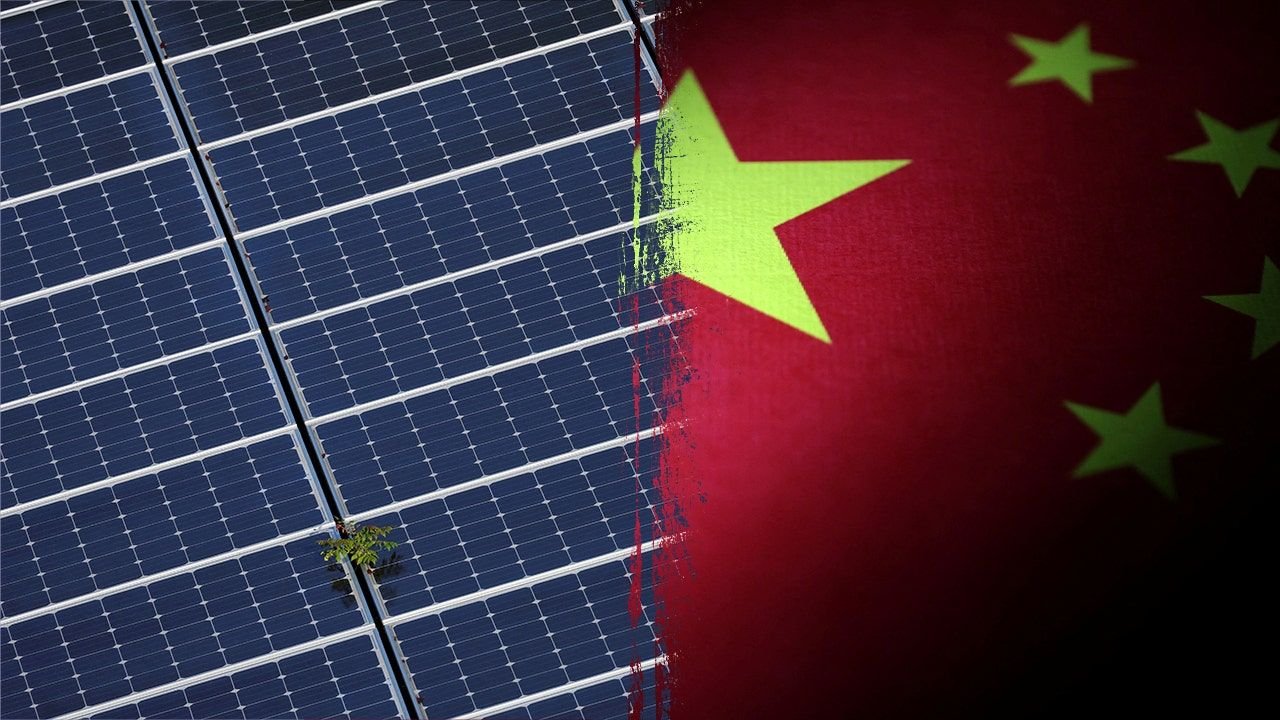
U.S. energy officials are reassessing the risk posed by Chinese-made devices that play a critical role in renewable energy infrastructure after unexplained communication equipment was found inside some of them, two people familiar with the matter said.
Power inverters, which are predominantly produced in China, are used throughout the world to connect solar panels and wind turbines to electricity grids. They are also found in batteries, heat pumps and electric vehicle chargers.
While inverters are built to allow remote access for updates and maintenance, the utility companies that use them typically install firewalls to prevent direct communication back to China.
CHINESE OFFICIALS CLAIMED BEHIND CLOSED DOORS PRC PLAYED ROLE IN US CYBERATTACKS: REPORT
However, rogue communication devices not listed in product documents have been found in some Chinese solar power inverters by U.S. experts who strip down equipment hooked up to grids to check for security issues, the two people said.
Over the past nine months, undocumented communication devices, including cellular radios, have also been found in some batteries from multiple Chinese suppliers, one of them said.
Reuters was unable to determine how many solar power inverters and batteries they have looked at.
Solar panels are arrayed on Earth Day in Northfield, Massachusetts, on April 22, 2022. (Reuters/Brian Snyder/File Photo)
The rogue components provide additional, undocumented communication channels that could allow firewalls to be circumvented remotely, with potentially catastrophic consequences, the two people said.
Both declined to be named because they did not have permission to speak to the media.
«We know that China believes there is value in placing at least some elements of our core infrastructure at risk of destruction or disruption,» said Mike Rogers, a former director of the U.S. National Security Agency. «I think that the Chinese are, in part, hoping that the widespread use of inverters limits the options that the West has to deal with the security issue.»
A spokesperson for the Chinese embassy in Washington said: «We oppose the generalization of the concept of national security, distorting and smearing China’s infrastructure achievements.»
Using the rogue communication devices to skirt firewalls and switch off inverters remotely, or change their settings, could destabilize power grids, damage energy infrastructure, and trigger widespread blackouts, experts said.
«That effectively means there is a built-in way to physically destroy the grid,» one of the people said,
The two people declined to name the Chinese manufacturers of the inverters and batteries with extra communication devices, nor say how many they had found in total.
The existence of the rogue devices has not previously been reported. The U.S. government has not publicly acknowledged the discoveries.
Asked for comment, the U.S. Department of Energy (DOE) said it continually assesses risk associated with emerging technologies and that there were significant challenges with manufacturers disclosing and documenting functionalities.
«While this functionality may not have malicious intent, it is critical for those procuring to have a full understanding of the capabilities of the products received,» a spokesperson said.
Work is ongoing to address any gaps in disclosures through «Software Bill of Materials» – or inventories of all the components that make up a software application – and other contractual requirements, the spokesperson said.
Trusted Equipment
As U.S.-China tensions escalate, the U.S. and others are reassessing China’s role in strategic infrastructure because of concerns about potential security vulnerabilities, two former government officials said.
«The threat we face from the Chinese Communist Party (CCP) is real and growing. Whether it’s telecom hacks or remotely accessing solar and battery inverters, the CCP stops at nothing to target our sensitive infrastructure and components,» said U.S. Representative August Pfluger, a Republican member of the Committee on Homeland Security.
«It is about time we ramp up our efforts to show China that compromising us will no longer be acceptable,» he told Reuters.
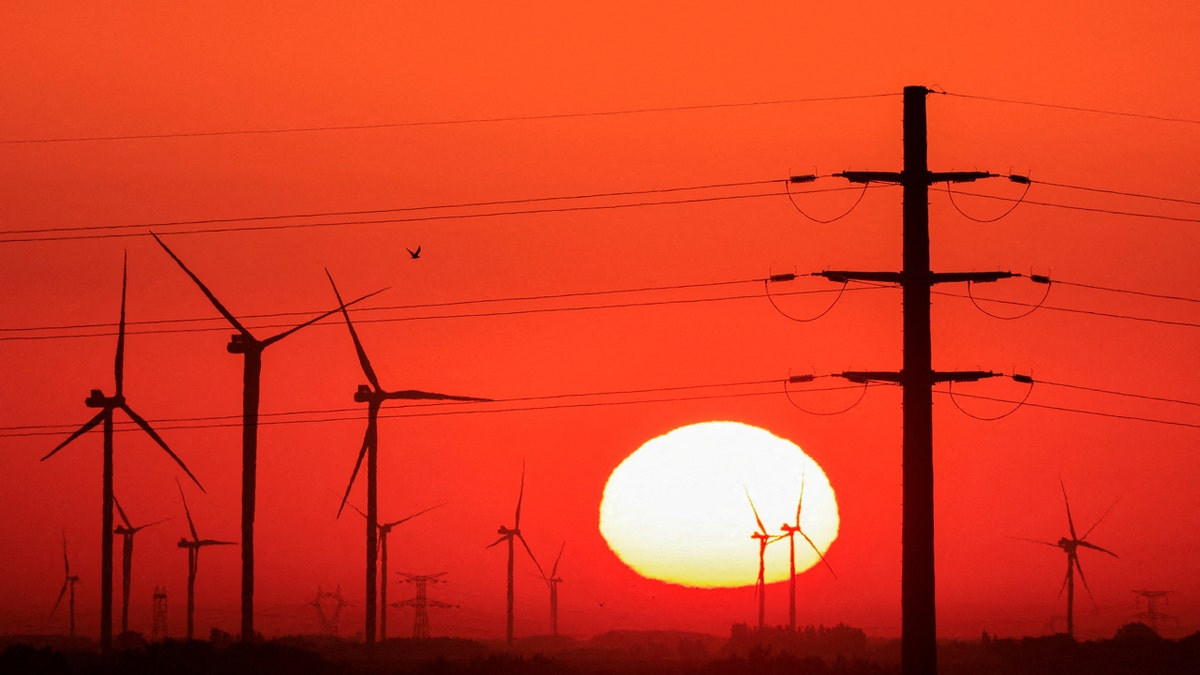
Chinese energy infrastructure plays a large role in the power grids of many European countries. (Reuters/Pascal Rossignol/File Photo)
In February, two U.S. Senators introduced the Decoupling from Foreign Adversarial Battery Dependence Act, banning the Department of Homeland Security from purchasing batteries from some Chinese entities, starting October 2027, due to national security concerns.
The bill was referred to the Senate Committee on Homeland Security and Governmental Affairs on March 11 and has yet to be enacted.
THE REAL BREAKTHROUGH IN U.S.–CHINA TRADE TALKS IS MUCH BIGGER THAN JUST TARIFFS
It aims to prevent Homeland Security from procuring batteries from six Chinese companies Washington says are closely linked to the Chinese Communist Party: Contemporary Amperex Technology Company (CATL), BYD Company, Envision Energy, EVE Energy Company, Hithium Energy Storage Technology Company, and Gotion High-tech Company.
None of the companies responded to requests for comment.
Utilities are now preparing for similar bans on Chinese inverter manufacturers, three people with knowledge of the matter said.
Some utilities, including Florida’s largest power supplier, Florida Power & Light Company, are attempting to minimize the use of Chinese inverters by sourcing equipment from elsewhere, according to two people familiar with the matter. FPL did not respond to requests for comment.
The DOE spokesperson said: «As more domestic manufacturing takes hold, DOE is working across the federal government to strengthen U.S. supply chains, providing additional opportunities to integrate trusted equipment into the power grid.»
‘Catastrophic Implications’
Huawei is the world’s largest supplier of inverters, accounting for 29% of shipments globally in 2022, followed by Chinese peers Sungrow and Ginlong Solis, according to consultancy Wood Mackenzie.
German solar developer 1Komma5 said, however, that it avoids Huawei inverters, because of the brand’s associations with security risks.
«Ten years ago, if you switched off the Chinese inverters, it would not have caused a dramatic thing to happen to European grids, but now the critical mass is much larger,» 1Komma5 Chief Executive Philipp Schroeder said.
«China’s dominance is becoming a bigger issue because of the growing renewables capacity on Western grids and the increased likelihood of a prolonged and serious confrontation between China and the West,» he said.
Since 2019, the U.S. has restricted Huawei’s access to U.S. technology, accusing the company of activities contrary to national security, which Huawei denies.
CHINESE IMPORTS TO US PLUMMET TO LOWEST LEVELS SINCE PANDEMIC AMID TRUMP TARIFFS
Chinese companies are required by law to cooperate with China’s intelligence agencies, giving the government potential control over Chinese-made inverters connected to foreign grids, experts said.
While Huawei decided to leave the U.S. inverter market in 2019 – the year its 5G telecoms equipment was banned – it remains a dominant supplier elsewhere.
Huawei declined to comment.
In Europe, exercising control over just 3 to 4 gigawatts of energy could cause widespread disruption to electricity supplies, experts said.
The European Solar Manufacturing Council estimates over 200 GW of European solar power capacity is linked to inverters made in China – equivalent to more than 200 nuclear power plants.
At the end of last year, there was 338 GW of installed solar power in Europe, according to industry association SolarPower Europe.
«If you remotely control a large enough number of home solar inverters, and do something nefarious at once, that could have catastrophic implications to the grid for a prolonged period of time,» said Uri Sadot, cybersecurity program director at Israeli inverter manufacturer SolarEdge.
Strategic Dependencies
Other countries such as Lithuania and Estonia acknowledge the threats to energy security. In November, the Lithuanian government passed a law blocking remote Chinese access to solar, wind and battery installations above 100 kilowatts – by default restricting the use of Chinese inverters.
Energy minister Zygimantas Vaiciunas said this could be extended to smaller rooftop solar installations.
Estonia’s Director General of the Foreign Intelligence Service, Kaupo Rosin, said the country could be at risk of blackmail from China if it did not ban Chinese technology in crucial parts of the economy, such as solar inverters.
Estonia’s Ministries of Defense and Climate declined to comment when asked if they had taken any action.
In Britain, the government’s review of Chinese renewable energy technology in the energy system – due to be concluded in the coming months – includes looking at inverters, a person familiar with the matter said.
In November, solar power inverters in the U.S. and elsewhere were disabled from China, highlighting the risk of foreign influence over local electricity supplies and causing concern among government officials, three people familiar with the matter said.
Reuters was unable to determine how many inverters were switched off, or the extent of disruption to grids. The DOE declined to comment on the incident.
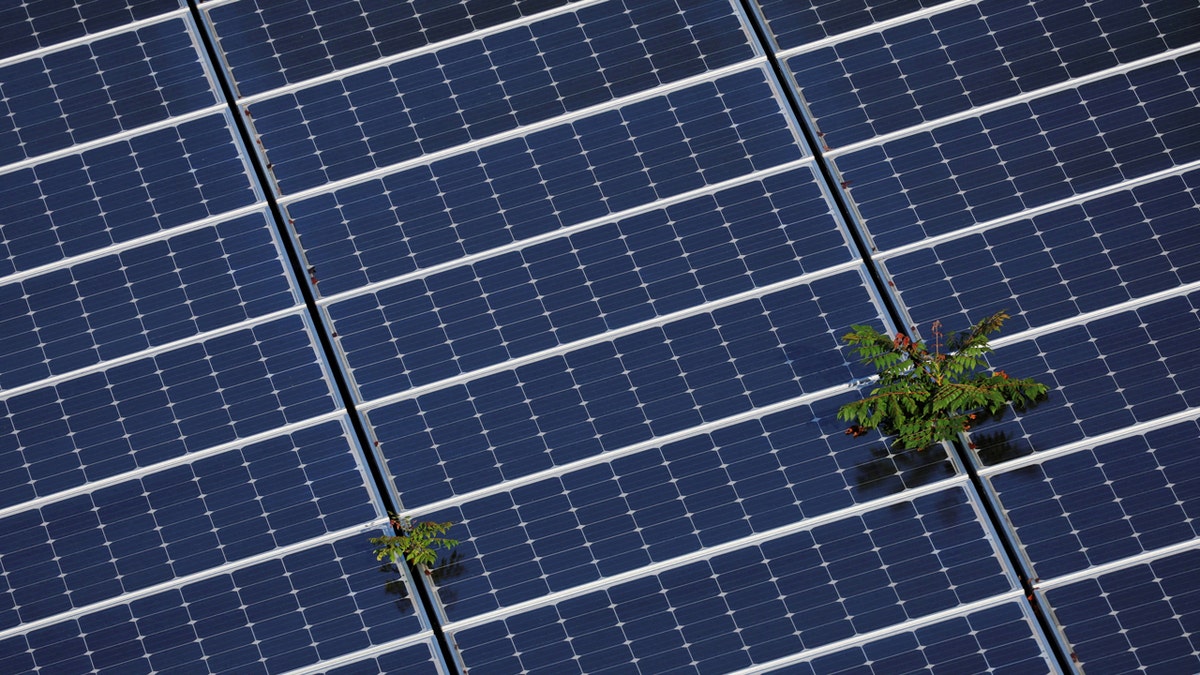
Plants grow through an array of solar panels in Fort Lauderdale, Florida, on May 6, 2022. (Reuters/Brian Snyder/File Photo)
The incident led to a commercial dispute between inverter suppliers Sol-Ark and Deye, the people said.
«Sol-Ark does not comment on vendor relationships, including any relationship with Deye, nor does it have any control over inverters that are not branded Sol-Ark, as was the case in the November 2024 situation you referenced,» a Sol-Ark spokesperson said.
Deye did not respond to requests for comment.
The energy sector is trailing other industries such as telecoms and semiconductors, where regulations have been introduced in Europe and the U.S. to mitigate China’s dominance.
Security analysts say this is partly because decisions about whether to secure energy infrastructure are mostly dictated by the size of any installation.
CLICK HERE TO GET THE FOX NEWS APP
Household solar or battery storage systems fall below thresholds where security requirements typically kick-in, they said, despite now contributing a significant share of power on many Western grids.
NATO, the 32-country Western security alliance, said China’s efforts to control member states’ critical infrastructure – including inverters – were intensifying.
«We must identify strategic dependencies and take steps to reduce them,» said a NATO official.
INTERNACIONAL
Los perros y los gatos pueden ser portadores secretos de ADN en las escenas del crimen

Perros y gatos pueden transportar ADN humano entre personas, objetos y ambientes, incluso a lugares donde quienes viven con ellos no estuvieron.
Científicos de Australia descubrieron que en escenas de crímenes, el material genético hallado en el pelaje o en superficies asociadas a los animales no siempre corresponde a quienes forman parte del hogar.
Ese material que se toma como parte de las investigaciones forenses puede incluir rastros de visitantes, personas que han transportado al animal o usuarios de los vehículos involucrados.
Este hallazgo, que fue publicado en la revista Forensic Science International, puede cambiar la manera en que la ciencia forense interpreta la evidencia en delitos donde hay perros o gatos.

El equipo comprobó que “los perros pueden servir como vectores efectivos para la transferencia de ADN humano”, incluso con contactos breves.
En el estudio participaron Heidi Monkman y Mariya Goray, de la Facultad de Ciencia e Ingeniería de la Universidad Flinders.
También colaboraron Roland van Oorschot, de la Oficina del Jefe Científico Forense en el Departamento de Servicios Forenses de la Policía de Victoria y de la Facultad de Agricultura, Biomedicina y Medio Ambiente de la Universidad La Trobe, y Volgin Luke, de Ciencia Forense de Australia Meridional.

La investigación buscó saber si los animales domésticos, presentes en muchas escenas de crímenes, pueden influir en el análisis de ADN.
Aunque ya se sabía que el material genético puede transferirse entre personas y objetos, el rol de perros y gatos como intermediarios había sido poco explorado.
El equipo observó que, a diferencia de objetos o prendas, los animales pueden almacenar y transferir ADN humano de quienes viven en el hogar, de personas visitantes y de quienes los manipulan para un traslado.
Esto es clave en delitos como el robo de animales de compañía, donde el ADN puede ayudar a reconstruir los hechos.

El objetivo fue determinar si un animal puede recibir, retener y trasladar ADN humano a personas y lugares diferentes. Para comprobarlo, diseñaron un experimento controlado.
Un cuidador, sin contacto previo con los animales ni con quienes viven en los hogares, trasladó a cinco perros de distintas razas entre viviendas y autos desconocidos para todos. Así, cualquier ADN hallado debía provenir de esa interacción puntual.
El análisis se centró en el cuerpo del perro, la ropa del cuidador y el interior de los autos. Los perros, la camisa del cuidador y el asiento trasero del auto fueron las superficies clave que se analizaron, detallaron.

Se seleccionaron cinco perros y un cuidador experimentado, sin vínculo previo con los animales ni con las familias. El cuidador tampoco había usado antes los autos, salvo uno propio.
Luego del traslado, los investigadores tomaron muestras de ADN en la cabeza, lomo y costados de cada perro, una hora después del contacto.
También recolectaron rastros en el asiento trasero de cada auto y en distintas partes de la camisa del cuidador.
El ADN de al menos una persona que vivía en el hogar se detectó en el 85 % de las muestras tomadas de los perros.

En los autos, la presencia de ese ADN alcanzó el 35 %, y en la ropa del cuidador, el 10 %. El ADN del cuidador apareció en el 85 % de sus propias camisas, en el 40 % de los perros y en el 13 % de los autos.
Se halló ADN de los propietarios de los autos en los perros, en la ropa del cuidador y en el interior del vehículo, aunque nunca hubo contacto directo entre ellos.
Así, la investigación demostró que los contactos breves pueden permitir la transferencia y posterior recuperación de ADN, incluso a través de intermediarios.

En el 75 % de las muestras hubo al menos un contribuyente desconocido, lo que muestra lo complejo que resulta rastrear el origen del ADN en la vida cotidiana.
El equipo recurrió a herramientas estadísticas para discriminar perfiles principales y minoritarios, y remarcó que la mayoría de estas transferencias indirectas se presentaron como componentes menores o minoritarios en la mezcla.
La cantidad de ADN recuperado varió según la zona del contacto y el tiempo. La cabeza y el lomo de los perros mostraron mayores cantidades.

El equipo reconoció que el tamaño de muestra fue reducido, lo que limita la posibilidad de generalizar estos resultados.
Consideran que su trabajo es solo un primer paso y sugieren ampliar el estudio con más animales, diferentes escenarios y otros tipos de contacto.
La conclusión central es que “los perros pueden actuar como vectores de transferencia de ADN cuando son trasladados entre dos lugares”, incluso si ese desplazamiento dura poco tiempo.

Recomiendan que, en casos con animales domésticos, se tomen muestras en la ropa, en los propios animales y en los vehículos involucrados.
La investigación subraya que la facilidad con la que el ADN viaja en contactos breves y su persistencia en distintas superficies obliga a repensar las estrategias de la ciencia forense en delitos con animales.
El estudio deja claro que perros y gatos no son solo testigos mudos en las escenas del crimen: pueden convertirse en piezas clave para resolver un caso o, al mismo tiempo, en el mayor enigma para quienes buscan la verdad.

En diálogo con Infobae, el doctor en ciencias naturales Guillermo Giovambattista, investigador en genética no humana del Instituto de Genética Veterinaria Ingeniero Fernando Dulout, dependiente del Conicet y de la Universidad Nacional de La Plata, en Argentina, explicó tras leer el estudio: “Cuando una persona toca un objeto, deja su ADN a través de la piel. Por eso, se han podido identificar perfiles genéticos al recuperar el ADN de superficies. Por lo cual, es lógico que si una persona acaricia a un perro o un gato, se podría recuperar su ADN con la técnica apropiada”.
Además, el experto recordó que “hubo casos judiciales en los que el ADN de un animal doméstico permitió vincular al sospechoso con el lugar del hecho”.
adventure,ai,animal,animal nose,bag,canine,chair,close up,cute,dog,domestic animals,domestic room,focus on foreground,front view,generative,generative ai,hound,journey,leaving,lifestyles,looking,looking at camera,luggage,mammal,no people,obedience,one animal,pampered pets,passenger,pets,portrait,puppy,purebred dog,relaxation,retriever,selective focus,sitting,small,suitcase,terrier,tourism,tourist,transportation,travel,travel destinations,vacations,waiting,walking,young animal
INTERNACIONAL
Leavitt brushes off Lutnick–Epstein heat with list of administration wins media ignored before ending briefing
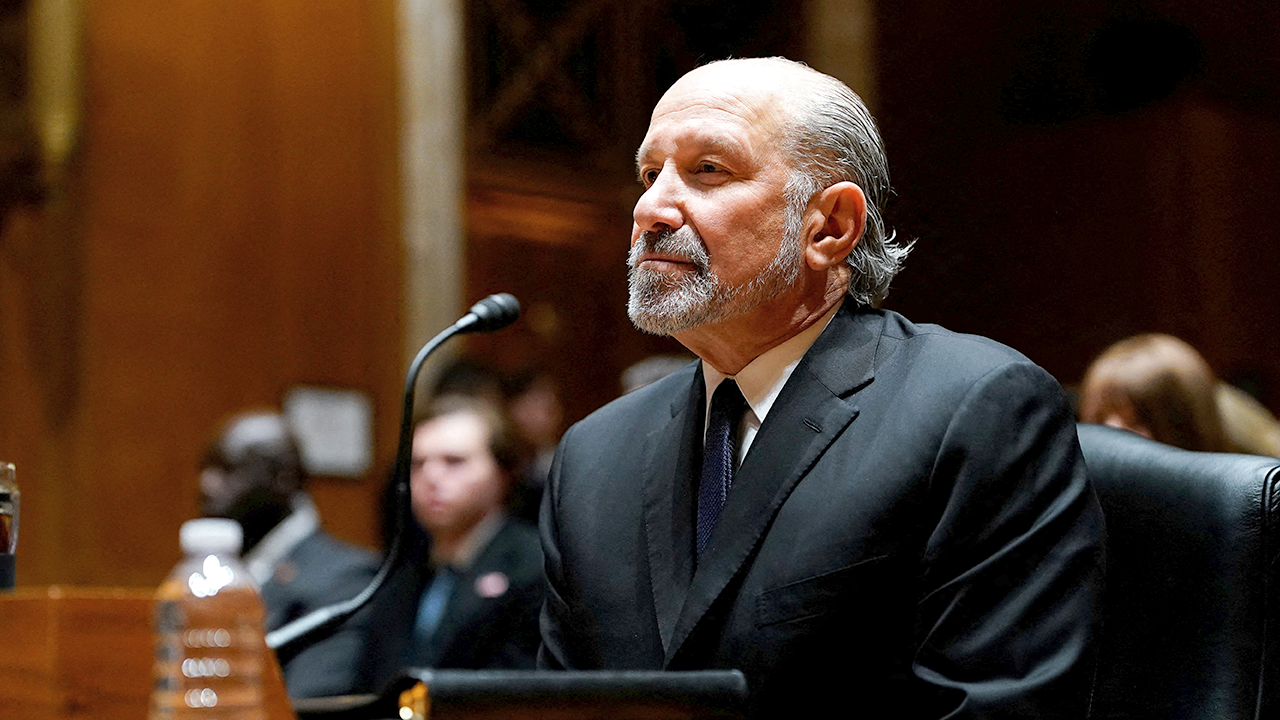
NEWYou can now listen to Fox News articles!
White House press secretary Karoline Leavitt brushed off a question about Commerce Secretary Howard Lutnick’s relationship with Jeffrey Epstein during a press briefing Tuesday before redirecting her response and mentioning the administration’s recent wins before ending a news conference.
«Secretary Lutnick remains a very important member of President Trump’s team, and the president fully supports the secretary,» Leavitt said Tuesday when asked if President Donald Trump and the White House still support the Commerce chief after his testimony before the Senate Appropriations subcommittee Tuesday.
Leavitt was repeatedly questioned about Epstein during the news conference, including regarding Lutnick telling lawmakers Tuesday he visited Epstein’s notorious island while on a family vacation in 2012 but that he otherwise had no relationship with the convicted sex offender.
«My wife was with me, as were my four children and nannies,» he said Tuesday. «I had another couple with. They were there as well with their children, and we had lunch on the island — that is true — for an hour.
TRUMP THANKED FLORIDA POLICE FOR EPSTEIN PROBE IN 2000S, FLAGGED ‘EVIL’ GHISLAINE MAXWELL: FBI DOC
White House press secretary Karoline Leavitt said the administration continues to back Commerce Secretary Howard Lutnick when asked about his ties to Jeffrey Epstein. (Anna Moneymaker/Getty Images)
«I did not have any relationship with him. I barely had anything to do with that person, OK?»
Lutnick previously said he cut off contact with Epstein in 2005, but recent document releases from the Department of Justice’s investigations into Epstein show the pair communicated years later. Democrats and other critics have increasingly called for Lutnick’s ouster amid the document release, sparking questions whether the administration continues to support the Commerce chief.
EPSTEIN VICTIMS USE SUPER BOWL COMMERCIAL TO PRESSURE PAM BONDI OVER WITHHELD FILES
Leavitt said the administration continues to back Lutnick before launching into a series of wins notched under Trump’s watch that the media did not ask about during the press conference, including the Dow Jones Industrial Average crossing 50,000 points for the first time ever earlier in February.

White House press secretary Karoline Leavitt said Tuesday that the Trump administration continues to back Commerce Secretary Howard Lutnick when asked about his ties to Jeffrey Epstein. (Elizabeth Frantz/File Photo/Reuters)
«I will just point out that there are a lot of wins in the news this week that people in this room have not asked about because you continue to ask questions about the same subject,» Leavitt said.
«So, let me point them out for you again. On Friday, the Dow shattered 50,000 for the first time ever. This week, the American Society of Plastic Surgeons came out in opposition to gender mutilation surgeries for children. They are the first major medical group to do so.
GHISLAINE MAXWELL PLEADS FIFTH AMENDMENT, DODGES QUESTIONS IN HOUSE OVERSIGHT EPSTEIN PROBE

The Department of Justice released a trove of Epstein documents Dec. 19, 2026, after President Donald Trump signed the Epstein Files Transparency Act in November 2025. (Patrick McMullan via Getty Images)
«A federal appeals court today — nobody asked about that — just upheld the Trump administration’s policy of detaining illegal aliens, validating the strong measures that have driven illegal crossings to historic lows and sent a crystal clear message that, under President Trump, if you enter the country illegally, you will be detained and removed» she continued.
«Again, not a single question about this as the murder rate has plunged to a 125-year low as crime falls across the board thanks to President Trump’s crime crackdown.»
Leavitt added that national median rent prices fell to four-year lows and that mortgage affordability surged to a four-year high as the administration hammers home affordability to ease housing and cost woes.
«There’s a reason why Americans’ trust in mainstream media outlets is at an all-time low. They’re Fake News,» White House spokesman Kush Desai told Fox News Digital later Tuesday when asked about the exchange. «The Trump Administration will never hesitate to share the truth with the American people.»
Leavitt wrapped up the news conference after mentioning the administration’s wins, noting Trump’s busy schedule.
The briefing started roughly 40 minutes late, and Leavitt attributed the delay to a meeting with Trump to review updates on the Nancy Guthrie missing person case. The briefing lasted a total of just over 20 minutes.
CLICK HERE TO DOWNLOAD THE FOX NEWS APP
«We’re going to get back to business. The president is very busy today, and you will see him all tomorrow at the event in the East Room touting his administration’s energy policy,» she said.
commerce,jeffrey epstein,karoline leavitt,white house,politics,fox news media
INTERNACIONAL
UK public health system posts job ad for nurse focused on ‘close-relative marriage’

NEWYou can now listen to Fox News articles!
A government-run health trust in the United Kingdom recently advertised a nursing role focused on supporting families involved in «close-relative marriage,» a practice that often involves first cousins and is linked to higher genetic risks for children due to shared inherited genes, according to health officials.
The full-time position, titled «Neonatal Nurse – Close Relative Marriage,» aims to support families through «informed reproductive decision-making,» according to a job posting from Britain’s public health system, the National Health Service (NHS).
The role has since closed.
«Newborn Services is pleased to announce an exciting brand-new job opportunity for an experienced Neonatal Nurse,» according to the official job description.
UK PRIME MINISTER SUGGESTS FORMER PRINCE ANDREW SHOULD TESTIFY IN EPSTEIN INVESTIGATION
Sign for the NHS National Health Service outside a pharmacy in London, United Kingdom. (Mike Kemp/In Pictures via Getty Images)
Under the role, the nurse would «proactively work with at risk families practising close relative marriage to encourage a greater level of genetic testing and/or genetic awareness/literacy among families where consanguineous related disorders are present,» the description states. Consanguinity refers to relationships in which parents are biologically related, most commonly first cousins.
The posting also states the nurse would support the implementation of a national strategy at the local hospital level, help families make «informed choices in a culturally sensitive empowering way,» initiate «sensitive, appropriate conversations» about recessive genetic disorders, and «contribute to the reduction of health inequalities in infant and child mortality and morbidity.»
SPERM DONOR WITH HIDDEN CANCER GENE FATHERS NEARLY 200 KIDS, FAMILIES BLINDSIDED
While close-relative marriage is rare in most Western countries, it remains more common in parts of the Middle East and South Asia and within some immigrant communities in Britain, where the NHS has increasingly emphasized outreach, genetic counseling and risk awareness rather than discouraging the practice outright.
Cousin marriage is more prevalent among some communities in Britain, including those of Pakistani and Bangladeshi heritage, according to GB News.
The job posting also listed fluency in Urdu as a desirable skill, a language widely spoken among Pakistani communities in the U.K.
Medical researchers have long documented elevated genetic risks associated with close-relative relationships. A peer-reviewed study published in BMC Medical Genetics found that children born to consanguineous couples face a higher risk of congenital and genetic disorders, particularly autosomal recessive diseases, with the increased risk for children of first cousins estimated at 2% to 4% above the general population.

A sign welcomed visitors to Manchester University NHS Foundation Trust in Manchester, England. (Peter Byrne/PA Wire via Getty Images)
The researchers stressed that the vast majority of children born to related parents are healthy, but noted that genetic risk can vary widely between families and may be significantly higher in a minority of cases, depending on shared inherited DNA. The study also found it is not currently possible to predict which couples face the highest risk.
Emma Schubart, a research fellow at the Henry Jackson Society, warned that specialized NHS outreach risks normalizing close-relative relationships.
«The NHS’s creation of specialized nursing roles risks normalizing a practice that significantly elevates genetic risks, including a doubled likelihood of serious birth defects and heightened susceptibility to common diseases like type 2 diabetes,» Schubart told Fox News Digital in a statement. «For example, among British Pakistanis, a community where consanguinity rates remain high, individuals face 3–6 times the average UK risk of type 2 diabetes, with 5–18% of cases directly attributable to inbreeding. This translates to thousands of additional diabetes cases nationwide, placing undue strain on an already overburdened NHS.»
CLICK HERE TO DOWNLOAD THE FOX NEWS APP
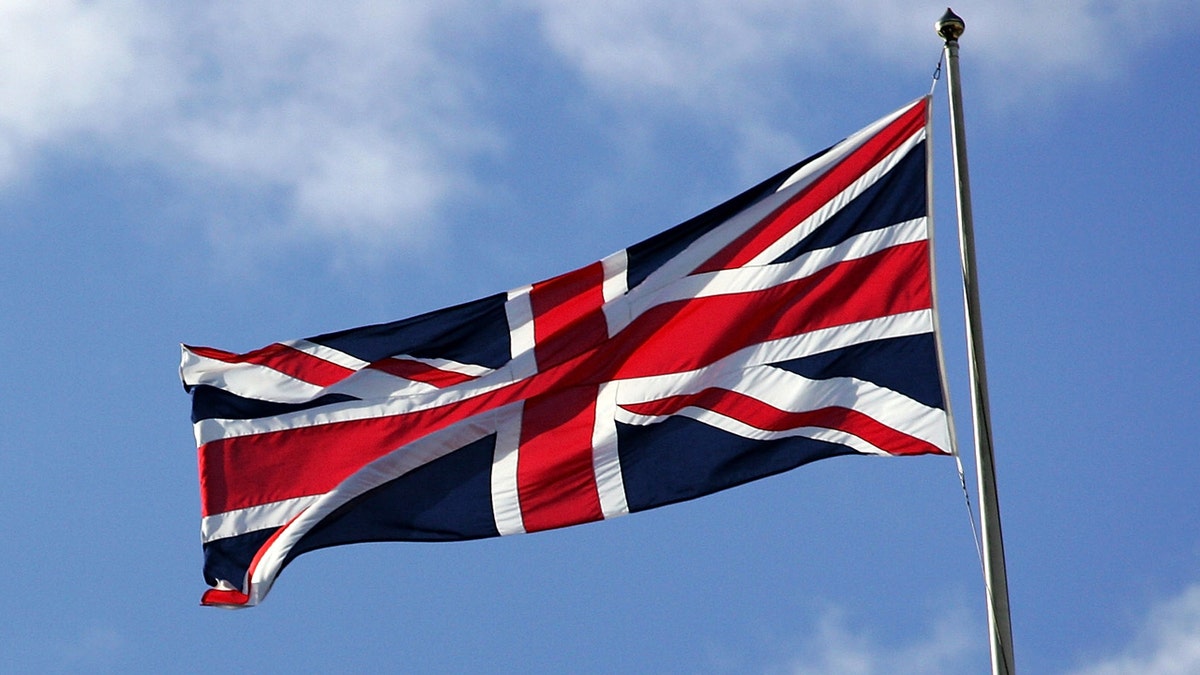
The Union Jack is photographed against a partly-cloudy sky. (Photo by Gareth Cattermole/Getty Images)
According to GB News, recent NHS guidance has described concerns about genetic risks from cousin marriage as exaggerated, a characterization that has drawn criticism from campaigners who argue the approach risks normalizing a practice that places avoidable burdens on children and public health systems.
The role was advertised by Manchester University NHS Foundation Trust, one of the United Kingdom’s largest NHS trusts, which operates 10 hospitals across Greater Manchester and Trafford in northwest England, according to the trust’s website. The job posting also sought candidates who «value diversity and difference,» according to the advert.
Fox News Digital reached out to Manchester University NHS Foundation Trust for comment.
united kingdom,europe,health

 ECONOMIA3 días ago
ECONOMIA3 días agoEl sector industrial advierte que la apertura económica exige eliminar las distorsiones internas

 POLITICA21 horas ago
POLITICA21 horas agoAcuartelamiento policial en Santa Fe: reclamo salarial y temor a un conflicto nacional de seguridad

 ECONOMIA3 días ago
ECONOMIA3 días agoMercados: subió la Bolsa argentina y cortó una serie negativa de siete ruedas consecutivas












